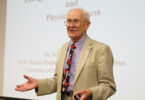Athens, Ga. – University of Georgia College of Education faculty members were ranked among the most productive faculty in science education research published during the first decade of the 21st century, according to a study in the March 2013 edition of the Journal of Education and Learning.
UGA science education faculty were ranked third in the nation in research productivity from 2000-2009 when data were adjusted for the acceptance rates of the four top science education journals studied and fourth when data were adjusted for raw number of publications.
UGA science education faculty published 55 articles in the top four international science education journals during the 2000s. Only science education faculty at the University of Michigan (84), Indiana University (66) and Purdue University (59) published more during that period.
UGA’s graduate programs in secondary education, which include science education, are perennially ranked among the Top 10 in the nation in U.S. News and World Report’s annual “Best Graduate Schools” survey.
“Science education faculty members have been leaders in the field dating back to the 1970s,” said Steve Oliver, professor and science education program coordinator during much of the last decade. “Those of us who replaced those earlier individuals came of age in the 2000s and wanted to participate fully in our professional field. A number of individuals who are no longer at UGA-Tom Koballa, Lynn Bryan and Carolyn Wallace-were very important to the success we had in those years.”
Today, UGA’s faculty members in science education continue research to develop new and better methods for instruction to enhance each student’s education from elementary school through doctoral studies.
For instance, researcher Ji Shen is investigating the most effective MBI practices for successful K-12 science education learning over the past three decades.
Shen, an assistant professor of mathematics and science education, is directing another study to design and implement technology-enhanced formative assessments to help college students integrate scientific knowledge and solve complex problems across disciplines. Specifically, researchers are targeting fundamental biological processes in physiological contexts that are closely related to physics. The assessments will be administered to college students enrolled in introductory physics, biology, physiology and science education courses.
Oliver is one of five UGA researchers leading a five-year, multi-discipline, partnership project among scientists and science educators at UGA, science teachers in high school and the national Biological Sciences Curriculum Study to create and evaluate curricular materials that use highly interactive 3-D models and animations of physiological processes that could set new standards in science education.
Two new senior faculty members who joined the College of Education in 2012-Barbara Crawford and Julie Luft-both bring groundbreaking research projects to UGA.
Crawford’s research focuses on how to move the essence of inquiry into the science classroom, how to support teachers in engaging students in authentic science, and how to alter and shape views of science in students generally underrepresented in the sciences (including English language learners).
Luft, the inaugural Athletic Association Professor of Mathematics and Science Education, was named the 2012 Outstanding Mentor of the Year by the Association for Science Teacher Education last fall.
Her current research focuses on beginning secondary science teachers and the development of their knowledge and instructional practices during their first five years in the classroom. Her work reveals the importance of content knowledge during induction programs and suggests new roles for science educators in higher education. In 2012, research from this project received the Journal of Research in Science Teaching Award for the most significant publication of the year.
Research published in science education journals impacts a wide range of areas, ranging from teacher education to curriculum development to assessment to policy. This study identifies the places where science educators are producing new knowledge, which can inform faculty, current and future graduate students, teachers of science, and policymakers for United States K-12 science, according to authors Lloyd Barrow and Nai-en Tang, both of the University of Missouri.
The abstract and full text of the science education research productivity study is available at www.ccsenet.org/journal/index.php/jel/article/view/25011.






